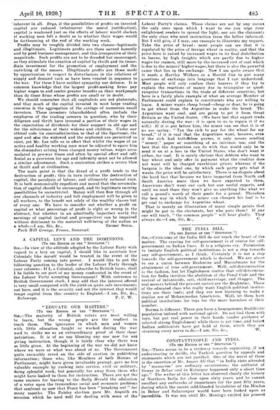"EDUCATE OUR MASTERS."
(To THE EDITOR OF THE " SPECTATOR.") Sul,—The majority of British voters are most willing to learn, but the wrong people are the readiest to teach them. The ignorance in which men and women with little education fought or worked during the war used to strike me as an extraordinary proof of their sheer patriotism. It is of no use blaming any one now for not giving instruction, though it is fairly clear why there was so little given. At the beginning of the war we did not know where we were or what was ahead of us. The Government quite excusably erred on the side of caution in publishing information; those who, like Members of both Houses of Parliament, might have given invaluable precept, gave no less valuable example by rushing into service, civil or military, doing splendid work, but generally far away from those who might have looked to them for instruction. There are not the same excuses for leaving to the Daily Herald the education of a voter upon the tremendous social and economic problems that confront us "nowthat Peace has been " breaking out " for many months. The Paisley election gave Mr. Asquith an occasion which he used well for dealing with some of the Labour Party's claims. Those claims are not by any means the only ones upon which I want to see you urge your enlightened readers to spread the light, nor are the claimants the only class who need instruction from the better informed. But I will give, if I may, one example to illustrate my request. Take the price of bread : most people can see that it is regulated by the price of foreign wheat in reality, and that the price here is raised by increased wages in its final distribution in loaves, by high freights which are partly due to higher wages for seamen, still more by the increased cost of coal which is due to the miners' higher wages, but there is also the powerful cause that lies in the exchange. Now I am quite aware that it needs a Hartley Withers or a Harold Cox to put many questions of exchange into language that I can understand. Most people will only confuse their hearers if they try to explain the reactions of money due to triangular or quad- rangular transactions in the trade of different countries, but here is a fairly plain example of what an average Member of Parliament could explain to constituents who are willing to learn. A miner wants cheap bread—cheap or dear, he is going to get wheat from the Argentine to make the bread. The Argentines want coal, and are going to get it from Great Britain or the United States. (We have lost that export trade naturally during the war : it is open to us to regain it if W4 will.) If it is put before him, the miner can see that it is of no use saying: " Tax the rich to pay for the wheat for my bread," if it is coal that the Argentines want, because, even if the rich had bottotilees purses, it only means sending " money," paper or something of no intrinsic use, and the best that the Argentines can do with that would only be to send it on at a loss to the United States, who don't want it either, for coal. It is surely obvious that debtors who want to buy wheat and only offer in payment what the creditor does not want will be charged exorbitant prices, whereas if the bargain is the ideal one, by which each party gets what it wants, the price will be satisfactory. There is no dispute about the hard fact that'because we have imported from North and South America more than we have exported to them, Americans don't want our cash but our useful exports, and until we send those they won't give us anything like what W3 call a pound's worth of their goods for a pound. Therefore the best way in which the miner can cheapen his loaf is is get coal to exchange for Argentine wheat.
That is merely an illustration of many simple points that might be put to the electorate, but who puts them? If any one will teach, " the common people " will hear gladly. They


































 Previous page
Previous page